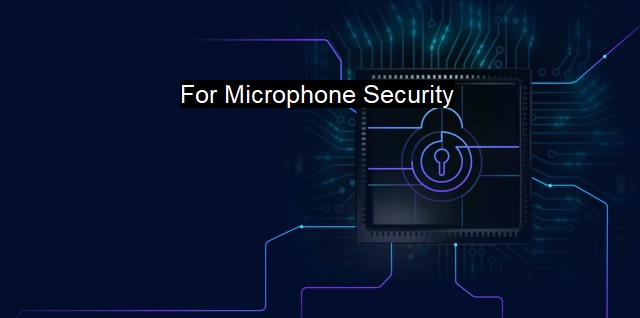What is For Microphone Security?
Combatting Ear-drop Attacks: Strengthening Microphone Security with Antivirus Protection
Microphone security, as the term suggests, refers to safeguarding the microphone-feature in electronic devices from being exploited by malevolent cyber attackers. In the domain of cybersecurity, microphone security is key to ensuring audio information security. The microphone in various kinds of devices - be it a smartphone, tablet, laptop, or desktop computer - has potential exposure to cybersecurity threats. Cyber attackers can hack into these devices and activate the microphones, eavesdrop or record the environment's sound, including private conversations, without the knowledge or permission of the owner, infrowering on their privacy.Every day, people use their electronic devices for various purposes – business-related meetings and conversations, confidential and private calls, or recreational use like elicit conversations, gaming, and much more. The microphone in these devices, when hacked, can violate privacy rights and leak sensitive information. This type of threat may not steal or corrupt data, but they do allow an unauthorized individual access to the private sound bytes which can be used for various criminal purposes, like blackmailing, or for conducting corporate espionage by competitors to gain a competitive edge. As such, shielding microphones from potential cyber threats becomes an absolute necessity, resulting in enhanced importance for microphone security.
Antivirus software plays a vital role in providing microphone security. Updated antivirus software's are equipped with features that not only block as well as notify of such intrusion attempts, but also encrypt the consumed data. They help protect against malicious code and applications designed to exploit your machine’s inbuilt microphone. They provide 'real-time protection,' continuously monitoring computing tasks and processes and ensuring no unauthorized capture of audio data occurs by identifying and mitigating suspicious activities.
Advanced antivirus software makes use of Machine Learning (ML) and Artificial Intelligence (AI) tendencies for providing the best proactive protection available. With their advanced behavior analysis techniques, they prevent zero-day attacks. These are unforeseeable threats that expose vulnerabilities of software in different stages of development, and which traditional virus protection methods find challenging to identify.
Other practices also contribute to microphone security. These include frequently updating the operating system software and other applications installed in a device, using firewalls or microphone blockers, and controlling third-party application access to microphones and other sensitive device components.
More attention has been focused on promoting secure environments where the privacy of individuals can be effectively maintained and preventing security breaches. Therefore, strategies that integrate measures for enhanced microphone security with the overall cybersecurity approach have become common.
A comprehensive strategy is vital to fight against potential threats, and to build a strong defense mechanism. Cybersecurity's end goal is to establish a secure digital environment and maintain users' trust, both in personal and professional contexts. In this goal, there is a need for a dedicated focus on every potential area of exploit like the device's microphone. Therefore, protecting the microphone with robust cybersecurity measures, such as powerful and updated antivirus software, is an effective step against anonymous eavesdropping and illicit audio data capture, adding another layer to users' security and privacy.
Microphone security, though sometimes overlooked, forms a significant part of cybersecurity given the rampant use of smart devices today. It is important for us to bear in mind that remaining aware and vigilant of the digital threats we face today and taking preventive measures would mean staying a step ahead of malicious activities that can compromise our personal and inevitable corporate privacy. By ensuring your microphones are secure, you're contributing a significant part in maintaining an overall safer digital environment.

| | A | | | B | | | C | | | D | | | E | | | F | | | G | | | H | | | I | | | J | | | K | | | L | | | M | |
| | N | | | O | | | P | | | Q | | | R | | | S | | | T | | | U | | | V | | | W | | | X | | | Y | | | Z | |
| | 1 | | | 2 | | | 3 | | | 4 | | | 7 | | | 8 | | |||||||